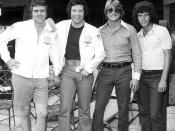The core of The Glass Menagerie rests on the dysfunctional relationship of the Wingfield family and the distinctive quirks that plague them. The matriarch, Amanda, is unable to move past the days of old with her memories of southern hospitality and idyllic youth. Laura, the ÃÂpeculiarÃÂ daughter, has such an extreme case of social anxiety that she rarely ventures from the house, mostly retreating into another realm with her glass collection. Tom is the more social son who also serves as narrator of the play. He prefers to use cruelty and indifference to separate himself from the needy women in his life while using nighttime outings as a physical escape from the doldrums of life. Tom and Amanda, the two more domineering personalities, each have a unique way of reacting to their view of reality, and the subsequent effect of entrapment, and each attitude takes its owner in a different direction.
Tom is the seemingly normal member of the highly dysfunctional Wingfield clan. He holds down a decent though boring job to care for his mother and sister since their father has been long gone. But Tom longs for a much more adventurous life than the one he presently occupies. His reality is one of obligation and frustration. When Tom tells his mother ÃÂI give up all that I dream of doing and being ever!ÃÂ it is coming from the remorse he feels over the course his life has taken (Williams 13). He views the reality of his father leaving as his own coming into the head of the household position and that road is not easily taken. TomÃÂs fatherÃÂs absence traps Tom with a family who need him even though he longs to be anywhere but home. Once he has spoken these words, however, he promises to devalue the statement by accomplishing new goals that will hopefully release him from his motherÃÂs grip. TomÃÂs opinion ÃÂIÃÂve got no thing; no single thing in my life here that I can call my own!ÃÂ shows that he feels out of control of his own life (Williams 25). The feeling that nothing is his leads him to use escapes like the movies, dance hall, and alcohol to lift his spirits by temporarily making choices by himself for himself. The movies represent a major escape Tom uses before going it alone in the world. Viewing his life as an uncontrollable force causes him to attend a movie almost nightly and not return home until the early hours of the morning. He believes he is getting a glimpse into the exciting ÃÂrealÃÂ world that he wishes to be a part of but eventually gets sick of all ÃÂthose glamorous peopleÃÂhaving adventuresÃÂhogging it all, gobbling the whole thing upÃÂ and makes the decision to move on from his demanding family into a life of journeys and exploration of the world (Williams 60). Another means of escape for Tom that pushes him to leave the Wingfield apartment is the fact that he feels not one person understands him. He tells his family ÃÂThereÃÂs so much in my heart that I canÃÂt describe to you!ÃÂ (Williams 55). The pain Tom feels in not being able to verbally articulate his thoughts flows onto paper through poetry and other writing. In doing so he is able to alleviate some pressure but still comes to the decision to move on from his family. Tom reacts to the reality of a severe mother, dull surroundings, and frustrating situations with escapes that take him out of the present and into a world filled with illusions.
Amanda physically lives in the year 1937 but prefers to immerse herself in the memories from a seemingly pre-Civil War era. The abandonment of her husband years before continues to manifest itself into self-misery for Amanda and harsh actions onto her children. Even though she uses her nostalgia as a defense mechanism it seems to only bring about bitterness about a life unlived especially when she exclaims, ÃÂI could have been Mrs. Duncan J. Fitzhugh, mind you! But IÃÂIÃÂpicked your father!ÃÂ (Williams 6). She prefers to relive her past as an escape from the present reality because it is so unbecoming to her. Amanda usually uses her runaway husband as an excuse to be a recluse into the past with remarks comparing her former suitors to her current spouse but instead of these statements jolting her into a realization about the pathetic state of her life they simply continue to trap her in a cycle of unhappiness. This unhappiness causes her to then become impatient with her children, Tom and Laura; a perfect example being a time when Amanda tells Laura she has so embarrassed the family that she ÃÂwanted to find a hole in the ground and hide [herself]ÃÂ (Williams 45). These are harsh words for a daughter with little self-esteem and a son with even less motivation for life. It seems the only feelings she knows how to feel are ones of resentment and animosity which clearly rub off on both her children, although it different ways with Laura becoming emotionally weaker and Tom mentally distant. AmandaÃÂs past life is not only visible in her mental state but also appears physically as well. When Laura sees her coming to the door from a womenÃÂs meeting, ÃÂShe has on one of those cheap or imitation velvety-looking cloth coats with imitation for collar. Her hat is five or six years oldÃÂ and she is clutching an enormous black patent-leather pocketbook with nickel clasps and initialsÃÂ (Williams 46). Although itÃÂs unclear what is the fashionable style for the time period, the tone in which the passage is set clearly suggests Amanda being quite behind the times. AmandaÃÂs obvious wish is for a less stressful life than the one she previously occupies but her way of escaping her entrapment through daydreams and past experiences holds her back from ever achieving anything worthwhile or moving forward with her golden years.
Every action taken by an individual incites a reaction from either themselves or another. Tennessee WilliamsÃÂ play The Glass Menagerie is, therefore, realistic in the way it displays the struggles of its characters, Tom and Amanda. Although each person suffers from entrapment in their daily lives, they both handle themselves in drastically different ways. Reacting to the reality they believe exists causes each characterÃÂs life to take a different turn. Tom prefers to drive himself to leave his family so as to escape his frustration while Amanda favors reliving the past to avoid the present.
Williams, Tennessee. "The Glass Menagerie". New York: Random House, 1945.





